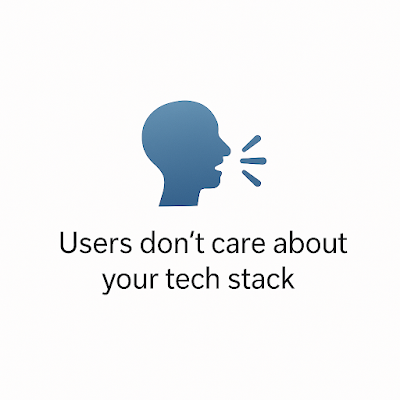You spent weeks, maybe months, crafting the perfect stack. Clean architecture. Rock-solid backend. Fully typed, tested, deployed across the edge with the latest tech.
Then someone tries your app and asks:
“Wait... what am I supposed to do here?”
And just like that, you're back at square one.
This is one of the hardest but most important lessons for any engineer transitioning into product-building:
Nobody cares how you built it. They only care what it does.
If you're stepping from engineer to founder or product creator, internalizing this shift is everything. Otherwise, you’ll keep building for an audience of one — yourself.
Your Tech Stack Is Invisible (Until It Breaks):
To users, your tech stack is like plumbing — they only notice it when it leaks.
They don’t care whether you used Next.js, Rails, Go or something you invented last week. They aren't inspecting your network requests. They aren’t marveling at your database sharding.
They care about speed. They care about clarity. They care about how quickly they can understand what your app does — and whether it makes their life better.
Even if you’re building for a developer audience, it’s still not your stack that wins them over. It’s the experience. When you try a new tool, you aren’t impressed because it uses Bun or Rust under the hood — you’re impressed because it actually helps you.
Engineers Love the "How"; Users Care About the "What":
As developers, we’re obsessed with how things are made: clean codebases, elegant patterns, scalable infrastructure.
Users? They just want the result.
No one rewards you for a serverless backend. No one gives you bonus points for implementing microservices correctly. If your app is confusing, slow, or unclear, users bounce — regardless of how beautiful the architecture is.
That’s the gap.
What we see as impressive, users see as... irrelevant.
The Real Challenge: Shifting from Builder to Product Thinker:
The biggest hurdle isn’t technical. It’s mental.
As engineers, we're conditioned to admire smart solutions. But when you're building a product, your cleverness is invisible. Your users only see the results.
Becoming a product builder requires humility.
You have to let go of the ego that comes with shipping beautiful code — and instead obsess over delivering value that’s easy to understand.
And you will likely learn this lesson the hard way.
You'll watch someone ship a basic Notion page or a no-code app — something you would never brag about technically — and they’ll be the ones making real sales.
You'll wonder, "How is this even possible?"
But the truth is: they weren’t trying to be impressive.
They were trying to be useful.
Overengineering Is a Momentum Killer:
Early on, trying to "do it right" often means you don’t ship at all.
You convince yourself that a custom design system, a complex caching layer, or a cutting-edge event bus is critical. But often, it’s just fear:
Fear of launching
Fear of feedback
Fear of finding out nobody wants what you built
And so you hide behind infrastructure.
I’ve made this mistake plenty of times: building for scale before I had a single user. Spending days tuning the backend instead of talking to real customers.
Every time, I thought I was being smart.
Really, I was avoiding the uncomfortable work: validating the idea.
Simplicity Wins. Always:
You don't need to be clever.
You need to be clear.
A product that's simple, easy to understand, and solves a real problem will always beat a sophisticated, overengineered one that doesn’t.
That means:
Crystal-clear messaging
Predictable, intuitive UX
Immediate, obvious value
It’s harder than it sounds — because it forces you to kill the desire to be “smart” and replace it with a ruthless focus on simplicity.
People Share Solutions, Not Tech Stacks:
Think about the last time you recommended an app to a friend.
You didn’t say, "Hey, you should check this out — it’s built with HTMX and R2!"
You said something like, "This tool saved me hours," or "This app is so easy to use."
People don’t brag about your tech stack.
They brag about how your product made their life better.
Tech Matters — But Later:
Architecture, clean code, scalability — all these things eventually matter.
But not at the start.
If you’re not solving a real, burning problem, no amount of beautiful engineering will save you.
You can’t refactor your way to product-market fit.
You can’t optimize your way out of a lack of demand.
First, build something people care about.
Then, once you have traction, you can make it scalable, elegant, and beautiful behind the scenes.
Final Thoughts:
Here’s what I finally understood:
Nobody cares how you built it. They only care what it does.
So stop building to impress other engineers.
Start building to solve real problems.
Focus on outcomes, not accolades.
That’s the path to something that actually matters.

